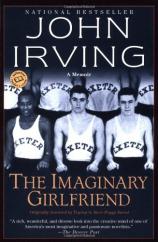Reading Group Guide
Discussion Questions
The Imaginary Girlfriend

1. How would you describe the narrative voice in The Imaginary Girlfriend? What kind of reader do you think John Irving had in mind while writing this memoir?
2. What is the significance of the title?
3. What kind of relationship does The Imaginary Girlfriend suggest Irving has with the past? How is his attitude toward the past conveyed in content and in tone?
4. Considering that many of the events and people depicted in The Imaginary Girlfriend are from distant eras of Irving's life, and that he seems to have a remarkably lucid memory, why do you think he draws so much attention to the names and faces he doesn't remember?
5. Farrokh Daruwalla, one of the central characters in Irving's A Son of the Circus, "suppose[s] that the auto-biography of a novelist almost qualifie[s] as fiction-- surely novelists wouldn't resist the impulse to make up their autobiographies." Do you think this assumption applies to The Imaginary Girlfriend?
6. In the beginning of The Imaginary Girlfriend Irving writes: "When you love something, you have the capacity to bore everyone about why--it doesn't matter why." How is this distinction between love and reaons for love evident in Irving's depiction of the wrestling world? Do you think it also relates to his approach to reading?
7. How would you characterize Irving's feelings about formal education, first as a student and later as a teacher? How do these attitudes compare to his thoughts on being in the wrestling world, as a wrestler and as a coach?
8. Wrestling and writing are two of the passions--and disciplines--that have shaped Irving's life. How does Irving go from thinking he "could be a wrestler or a writer, but not both" to finding a way to reconcile the two activities?
9. Irving writes, "My life in wrestling is one-eighth talent and seven-eighths discipline. I believe that my life as a writer consists of one-eighth talent and seven-eighths discipline, too." While most of us are probably very skeptical about Irving's writing being based on this proportion of talent to discipline, the concept is intriguing. How does this claim affect your understanding of Irving as a person? Does it change your perception of the writing process?
10. John Irving's writing style is distinctive in many ways--including his "archaic" use of the semi-colon. In The Imaginary Girlfriend he also uses a large number of parentheses. How do these parenthetical remarks impact the tone of the book?
11. In The Imaginary Girlfriend Irving reports, "Tom Williams once told me that I had a habit of attributing mythological proportions and legendary status to my characters." Do you think this appraisal of Irving's fictional characters applies to his portrayal of the people in his own life?
12. Irving describes himself as being on the outskirts at different stages in his life--as a dyslexic "faculty child" at Exeter, as a "halfway decent" wrestler at Pittsburgh, and as a married father in graduate school at Iowa: "What I remember best about being a student at Iowa was that sense of myself as being married, and being a father. It separated me from the majority of the other students." How does this vision of himself as being somehow in the minority seem to have affected his life and his writing?
13. Most of what we hear about Irving's family is in regard to wrestling--and yet because wrestling is clearly one of the loves of Irving's life, we get a sense of his life as a father: "Brendan, like his brother before him, had won the New England Class A title. It was the happiest night of my life." How do Irving's descriptions of sharing wrestling with his sons-- from his obvious pride in their accomplishments to his interest in their changing weight classes--help give us a picture of Irving's own development?
14. John Irving's novels are traditionally very long, both because of their rich description and their epic scope. The Imaginary Girlfriend is, by comparison, much shorter. Why do you think this is the case? How does The Imaginary Girlfriend fit into the memoir/autobiography category? How does it challenge the classification?
15. If you have read any of John Irving's novels, did you have ideas about what The Imaginary Girlfriend--which offers a glimpse into his writing and non-writing lives--would be like? Do you see any seeds of his fictional characters, storylines or themes in The Imaginary Girlfriend?
The Imaginary Girlfriend
- Publication Date: December 3, 2002
- Paperback: 192 pages
- Publisher: Ballantine Books
- ISBN-10: 0345458265
- ISBN-13: 9780345458261







